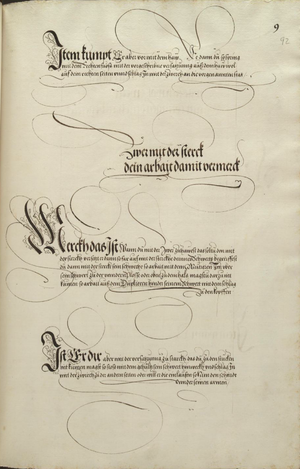|
|
You are not currently logged in. Are you accessing the unsecure (http) portal? Click here to switch to the secure portal. |
User:Kendra Brown/Latin Lew/86r
Jump to navigation
Jump to search
Munich 86r / PDF page 17
Contents
Missing zettel verses from PHM Dresden 92r (21)
German
- Zwer mit der sterck
- dein arbait damit vermerck
English (Fritz)
- Twer with the strong/strength.
- Mark your work with this.
Notes
This means the strength of the body as well as the strong of the sword.
86r a
86r a Latin
- Tum etiam maxime curabis transversarium feriundo,
- ut totis viribus id fiat,
- vel loco ensis firmiori,
- adversario aute[m] id excipiente[^1],
- tu si firmiorem ensis partem sustuleris,
- atq[ue] ea parte ipsius hostis infirmiorem senseris,
- Mutationibus sup[er] eius ense directis versus infernas nuditates utitor,
- vel si mavis versus collu[m] ipsius.
- Veru[m] si id nequibis,
- co[n]duplationes retro ipsius gladiu[m] exerceas,
- inde autem curabis ut adversarij caput concutias.
86r a English
- Moreover and in addition, you will take the greatest of care when striking the transverse,
- so that [you] do it with all strength,
- or at the stouter part of the sword,
- if, however, IT has been intercepted by the adversary,
- you lift the stouter part of the sword,
- and if using this part you perceive the weaker of the enemy himself,
- use alterations ~shiftings~ directed above his sword toward the lower openings,
- or if you prefer toward his neck.
- Truly, if you cannot do this,
- employ repetitions to the back of his sword,
- thence also undertake that you should crash into the head of the adversary.
86r a notes
- [^1]: excipiente is the equivalent of 'versetzt er'
parallel phrase (Two targets), present in german
86r b
86r b Latin
- Caeterum
- si hostis adeò acriter se defendat[^2],
- ut co[m]memoratos habitus exercere no[n] possis,
- capulo ensis tui,
- adversarij gladiu[m] repellas,
- atq[ue] transversario alter[um] eius latus quasses,
- at si incurrere conetur,
- sub brachijs ipsius incisionis habitu[m] exerceas.
86r b English
- As for the rest,
- if the enemy protects himself so fiercely,
- that you are not able to employ the remembered/suggested skills,
- using the hilt of your sword,
- you drive back the sword of the adversary
- and batter his other side with the transverse,
- or if on the other hand he tries to run in,
- practice the skill of slicing under his arm.
86r b notes
- [^2]: defendat is the equivalent of 'mit der versatzung'
Missing zettel verses from PHM Dresden 92v (22)
German
- Zweer zu dem pflug
- zu dem Ochsenhart gefug
- was sich vol zweret
- mit springen dem haubt geferet
English (Fritz)
- Zwer to the Pflug,
- harm the Ochs hard.
- A good Zwer
- is a danger to the head with a leap.
86r c
86r c Latin
- Alius transversarii usus,
- In p[re]cede[n?]tibus dictu[m] est,
- q[uam?] Bos, et aratr[um] duo castra,
- vel custodi[a]e sint,
- hoc aute[m] loco quatuor nuditates appella[n?]t[ur] Bos et aratru[m].
- Bos, du[a]e sup[er]iores nuditates,
- hoc est, dextru[m] & sinistrum latus capitis.
- Aratr[um], du[a]e nuditates inferiores,
- id est duo latera infra cingulum.
- Eas igitur nuditates Transfersario pervestigabis in accedendo ad hostem.
86r c English
- [title]
- In the preceding it has been said,
- how the Ox and the plow \[may be\] two military camps,
- or they may be guards,
- here, on the other hand, four openings are called Ox and plow.
- The Ox, two openings above,
- this is, the right and left sides of the head.
- The Plow, two openings below,
- that is two sides below the belt.
- Therefore explore these openings thoroughly using the Transverse in the approach of the enemy.
86r c notes
two phrases explaining one concept here, present in german
86r d
86r d Latin
- Quum ad adversarium accesseris,
- et is contra te in custodia de die constiterit,
- tu[m] adversus eu[m] in latus dextr[um] prosilias dextro pede,
- atq[ue] totis viribus transfersarium lateri capitis eius sinistro,
- quod Bos dicitur,
- infligas superné,
- at si eum impetu[m] repellat[1] hostis,
- mox latus inferius dextru[m],
- quod prope vel sub cingulu[m] constat,
- inferné, quod aratru[m] dicitur.
- atq[ue] ita porrò Transversarios alternatim exerceas,
- facto altero superné,
- mox inferné aratru[m] concutias crucis instar.
86r d English
- When you would come near to the adversary,
- and he stands against you in the guard of the day,
- then advance the right foot against him toward the right side,
- and with all strength,
- dash the transverse above against the left side of the head,
- which is called Ox,
- and if the opponent drives that attack back,
- next [attack with the transverse][2] below at the lower right side,
- which stands near or below the belt,
- which is called plow.
- And so hereafter employ the Transverse alternately,
- first above,
- next below brandish the plow in the likeness of the cross.
86r d notes
- [^4]: repellat is the equivalent of 'versetzt er'
dictionary lookups:
parallel phrase referring to target area; German does not mention belts or areas near them in this paragraph but it's in the previous one.

